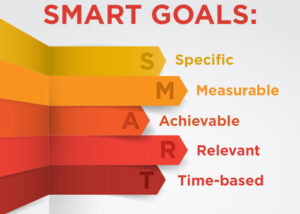How to set goals the right way
(≈8 min read)

There’s a weird contradiction that surfaces when someone decides they’re going to live their life based on goals.
Russ Harris – “If you’re living a goal-focused life, then no matter what you have, it’s never enough”
Imagine a person sets a goal and works and grinds and pushes until eventually that goal is reached. You’d expect for them to now feel happiness right?
Well maybe they do. But all too often, that happiness is short-lived. The contentment fades as the realisation surfaces that the underlying emptiness in the pit of their stomach is still there. They are still the exact same person as the person without this achievement.
And so how do they react to this feeling? They create another goal; another goal that doesn’t lead to freedom. There’s always that something else they feel like they need to achieve before maybe they’ll finally ‘be happy’.
How many times have you heard someone say things like:
“If I had his job, I’d be happy.”
“If I had her house, I’d be happy.”
“If I had the same amount of money as him, I’d be happy.”
It’s a common misconception people hold that if they were able to just get X,Y or Z, all their worries would fade and instantaneous happiness would ensue. If this is how you view happiness however, you’ll always be fighting a losing battle.
There’ll always be a gap between what you have and what you want and this gap makes us unhappy. But that gap will never close. No matter how much you have, it’s human nature to always want more. The urge to want things doesn’t stop when you reach the things you previously wanted; you’ll just come up with new things you need.
This means, if you’re not careful, you’ll spend your entire life climbing a mountain that never ends. You’ll tell yourself that when you reach the summit, happiness will finally arrive. But in reality, the summit simply doesn’t exist; every time you think you’ve reached it, you’ll see an even higher peak in the distance.
Goals are a fairly contentious topic and their efficiency when it comes to maximising our contentment is often debated. In this article, I’m going to discuss firstly why I think there’s an argument to be made to scrap the notion of goals and replace them with values, before going on to outline how in some situations goals might actually be useful.
I’ll then end by suggesting ways you might go about setting goals in these situations that are efficient and maximise the odds of achievement.
Should you really set goals?
Integrating a goal-based life with a value-based life
Goals, no doubt, have the capability of being extremely useful. There’s a reason they are advocated by so many top athletes and successful entrepreneurs. But there’s an argument to be made that true contentment arises not from achievement alone but from living a life based on our values.
Rather than creating a goal of “I’m going to run a marathon” for example, you might reframe this goal with the question of what value this goal is aiming towards, in mind. In this case for example:
“I value being fit and healthy”
Whatever goal you might have, you can extract a value from it and once you lay out these values and live your life in accordance to them, contentment is arguably much more likely. Instead of falling into the illusion that achieving said goal will make you happy, only to resort to setting another goal that you convince yourself will make you happy, and then other, there is an argument to be made for being able to set these short term goals under the guidance of an overarching value.
That way, there is no delusionary belief about achieving x to feel y. You know, that irrespective of action, you are living in accordance with what you deem valuable.
In that respect, it’s important to remember this:
You’re already enough
You don’t need to achieve that next goal in order for happiness to come. Every time you go for a run, for example, you’re appealing to this value of being fit and healthy and also reinforcing your identity as a ‘runner’ and through this continuous reinforcement, it might actually become easier to achieve that goal of running a marathon than if you were to set it as an isolated, hopeful target to try and get close to.
Happiness requires underlying meaning; it requires living a life led by what’s meaningful to you. And that’s why the extraction of values from goals can help focus your attention on why you truly want to achieve this thing you set out to achieve.
Realise goals are just somewhere to aim at
Love, connection and meaning will always transcend self-improvement and without them in your life to start with, you’re not addressing the underlying issue. No matter how productive or healthy or athletic you are, there will always be someone better than you, someone who you can use to deceive yourself into believing that the current version of you is not enough.
And no matter how much you achieve, you’ll always be able to set another goal that doesn’t lead to freedom.
That’s why if you’re striving to achieve something, focusing on loving the journey as opposed to becoming transfixed on obtaining the desired outcome is so important.
For a lot of us, we enjoy fantasising over the end result (the lean body, the athletic endurance, the flexibility) but despise the actual process required to get there. Sitting in bed and thinking about what it’d feel like to be a healthy weight is a very different thing to when your muscles are burning and your forehead is dripping with sweat and your whole body feels like collapsing. We, shockingly, don’t want to feel that kind of pain. We want the end result yet are not willing to adhere to the process required to get there.
And so the way to bypass this is by instead of fixating on the end goal, focusing on the journey. Learn to love the journey. Learn to love that kind of pain that you know is growing you. Learn to love that feeling when you can run that extra mile, or lift a little more than you could yesterday. That needs to be your motivation. Not the end goal but the process.
You might also notice that once you’ve achieved a big goal, your life suddenly starts to feel empty. The reason for this is because the psychological research suggests that we are all prone to something known as ‘arrival fallacy’ – this idea that once we arrive at our goal we will feel much happier. Truth is, you probably won’t. It’s simply human nature that we get significantly more contentment not from reaching the goal but from chasing it.
But while chasing it, you also need to keep in mind that value you’ve established which is linked to the goal.
In conclusion, enjoy the process of change. Don’t fixate on the end result.
But goals can still be useful…
Having talked about why setting isolated goals to go towards might not be the best way of reaching contentment, it’s still almost indisputable that goals are an incredibly important mechanism to help us achieve things. And goals, when set well, are actually pretty instrumental in constructing a meaningful life. A quote from Nietzsche:
“He who has a why to live for can bear almost any how”
Once you’ve established that why, that ultimate noble goal, the reason for your existence, life suddenly becomes a whole lot more manageable. You have a reason to battle through the storms life will inevitably throw at you, a reason to continue pushing when things get tough.
A well set goal can give you a reason to keep battling. The Nietzsche quote is discussed in quite some depth in Victor Frankl’s novel, “Man’s search for meaning” where he outlines how those in Nazi prison camps who had some reason to continue living, whether that be to see their children or to finish their novel, were much more likely to survive than those who didn’t.
The same can be said for setting meaningful goals. A well set meaningful goal, can serve to push you on to achieve what you set out to achieve.
P.S. I discuss ‘how to find your why’ in much more depth in my article ‘How to stay motivated while pursuing your dream’.
So it seems like we need to find some middle ground. We need somewhere to aim, somewhere to focus our attention towards, but we also need to ensure that we don’t get too sucked into achieving these arbitrary goals that our entire existence becomes dependent on them and we forget to remember to enjoy the present.
So how can we set good goals?
Don’t set a dead person’s goal
The first rule I’d give when it comes to setting goals comes from “The Happiness Trap” by Russ Harris who says:
“Don’t set a dead person’s goal”
Imagine you want to lose weight and you know that you binge eating cake every evening is contributing to the problem. Your goal might be:
“I won’t eat cake”
But this is a dead person’s goal since a dead person could do it better than you. So instead, the idea is to convert this thing you don’t want to do into an activity you could do as a replacement. Think about what you would be doing with your time if this ‘thing’, cake for example, you wanted to get rid of, didn’t exist.
If cake didn’t exist, maybe you’d go for a walk or play your violin or read a good book as a substitute for eating. Whatever it is, a new habit needs to be formed in order to eradicate the old destructive cycle.
Whenever you need some form of temporary pleasure in order to fill the void, rather than resorting to cake, your new habit reconditioning will help you to do that more productive thing.
So instead of “I won’t eat cake”, you could have:
“Every time I want to eat cake I will read a page of my book.”
That way your goal is not something you are not going to do, but something you are going to do, and this is arguably much more effective.
Make your goals specific and challenging
Although so far, I’ve mostly discussed the potential dangers of goal-setting, there are times when goals can be pretty damn powerful. It’s in these situations, where we might ask how best to set them. To answer this question, we can first turn to one of the most common pieces of advice given to school children: set SMART goals.

Research conducted by Locke and Latham builds on this SMART framework and suggests five key factors that are useful to consider when setting goals: clarity, challenge, commitment, feedback and task complexity.
Setting clear goals:
When considering clarity, think about how you’ll measure your success towards this goal. What specific metrics will you use? Provide as much detail as possible and be as clear as possible as to how you are going to measure this goal.
Setting challenging goals:
There’s a balance that needs to be struck between setting an unrealistically difficult goal and one that’s too easily achievable. A common mistake people make is to set the bar too low. We all secretly desire that rush of euphoria we get when we achieve something and so there’s a tendency for us to outline goals we are almost guaranteed to reach just so we can experience those feelings.
But sadly we haven’t actually progressed much from where we started. To avoid falling into this trap, it’s important to spend a good amount of time after writing your goal really considering whether this goal is too easily attainable.
Staying committed:
This is a point that Locke and Latham suggest which doesn’t really appear on the SMART framework. They note that a good way to stay committed to a goal is to practise visualisation techniques where you spend time sitting and imagining what it might be like for you to achieve your goal.
This is very similar to a technique I mention in ‘How to stay motivated while pursuing your dream’, which I refer to as the heaven/hell technique. To give a brief summary, the idea is to map out how your life might look like after achieving this goal and use this as a kind of heaven to run towards and simultaneously contrasting that with a visualisation of how your life might look like if things stay as they are and you don’t reach that goal. This way you also have a kind of hell to run away from.
Gaining feedback:
Locke and Latham suggest scheduling time once a week in order to sit down and take a look at what things are working and what things are not. To continuously repeat techniques and methods that lack efficiency would be to waste precious time in the future that could be used to go towards some other goal. That’s why in this time where you analyse what’s working and what’s not, you should make sure that you highlight which things you are doing that are good and working but also what things that are perhaps not as effective as you might want. It’s from this weekly analysis that you can adjust your strategy.
Consider task complexity:
It’s super easy to initially set a goal that feels out of reach and overwhelming. Locke and Latham suggest breaking goals that have a great degree of complexity down into smaller and more achievable smaller goals.
Make sure you notice and make changes if the goal you initially set is now igniting more stress than motivation. A lot of the time when a task appears too difficult, we can get stressed and that stress can lead to increased procrastination which can in turn lead to more stress and the cycle perpetuates.
To minimise the odds of this cycle surfacing in the first place, try and ensure that any goal that appears too complex or is too stress inducing is broken down into smaller sub-goals which seem attainable.
For example “I want to lose 10kg” might be broken into smaller sub-goals such as “I’m going to go for a run every Friday evening” which seem more manageable.
So when are goals useful?
Ultimately deciding whether you operate better living a goal based life or a value based life is subjective. People derive motivation from different sources. For me personally, I utilise SMART goals for short term projects but find the value based way of living much more efficient when thinking long term.
What constitutes ‘you’ is constantly changing as your experiences and interactions in the world alter your beliefs and desires. What you might consider to be your goal in three years’ time is very likely to change in a week or a months’ time.
When you appeal to your values however, these are generally intrinsic features you have that are fairly rigid. You can set short term goals in accordance to these values but with a higher value in mind at all times.
A nice trick to help you stick to living in accordance with your values
We all need ways to numb our brain. Some mindlessly scroll through their phone, some binge watch TV, some even take drugs, but whatever method you use, numbing is an unalterable inevitability. What’s not inevitable however is how much you numb and in what ways you numb.
This last method I’m going to suggest looks at the beneficial consequences of becoming consciously aware of when you are about to numb. The first stage is as follows:
Whenever you are about to engage in some sort of numbing activity, tell yourself, “I’m choosing to numb my mind.”
That’s it. Simple. You can still watch that final episode or play that video game or have that glass of alcohol. But you’ve now taken a big step. You’ve taken back control.
Before, you might have sat down after a long day and mindlessly, aimlessly reached into the fridge and grabbed a beer. And then again, without thought, you might have opened it up and started drinking. And then before you knew it, you were not even involved in the decision, it became a reflex, a habit – long day=beer in the evening.
By reminding yourself that you have a choice in the action, that you are actively choosing to numb your brain, you’re doing two things. Firstly you’re becoming more aware of how many times you’re actually doing said thing in a day, in turn reducing the likelihood of you numbing frequently and secondly, you’re reinforcing the idea that you have a degree of control over your brain.
When you start doing this step for long enough, you’ll realise just how many choices you have to make in a single day. Imagine after lunch, you always tend to spend half an hour aimlessly scrolling through your phone. You always do it without thinking. Well, now you realise you have a choice.
You have to think:
“I can either sit on my desk and work or I can numb my brain by mindlessly scrolling through my phone.”
And if you choose aimless scrolling and numbing, that’s totally cool. But the more you realise just how many choices you have and just how many times you are actively choosing to numb unconsciously, the higher the chances become of those bad habits changing. And if you can change those bad habits, you can also increase the odds of you doing things you actually value throughout the day.








